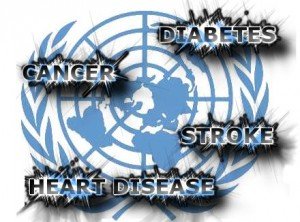As the United Nations High Level Meeting on Noncommunicable diseases (NDCs) concludes, some general resolutions have been agreed to – but public health researchers are deploring a lack of action and accountability from Member States.
 The meeting was held in New York on the 19th and 20th of September, bringing together UN Member States to discuss how the address the issue of preventable non-communicable disease such as heart disease, cancer and diabetes.
The meeting was held in New York on the 19th and 20th of September, bringing together UN Member States to discuss how the address the issue of preventable non-communicable disease such as heart disease, cancer and diabetes.
This is the second high level meeting ever held by the UN, the first being convened to address the issue of AIDS in 2001.
The NZ government sent a delegation which included: Hon Simon Power (Minister of Justice), Professor Sir Peter Gluckman (Chief Science Advisor to the Prime Minister), Dr Mark Jacobs (Director of Public Health, Ministry of Health), Hon Jim McLay (NZ Permanent Representative to the UN).
A political declaration was agreed to by the member states.
Five priorities put forward in the resolution, as explained by UN Secretary General Ban Ki Moon, are:
“First, implement a complete Government approach to adopting population-wide interventions that address risk factors.
“Second, undertake sustained primary health-care measures, including prioritized packages of essential interventions, along with palliative and long-term care, for those who already have non-communicable diseases or who are at high risk of contracting them.
“Third, strengthen the capacity of Member States to monitor such diseases and their risk factors and determinants, especially in lower-income countries; social data disaggregated by, for example, by gender, was also encouraged.
“Fourth, harness lessons learned from national HIV/AIDS, tuberculosis and malaria programmes in low- and middle-income countries for effective integration of communicable and non-communicable disease initiatives.
“Finally, prioritize the prevention and control of non-communicable diseases through commitments at the highest levels by Governments, the private sector, civil society, the United Nations and international organizations.”
Read can the full release from the United Nations here.
On behalf of New Zealand, Simon Power, made a statement. According the UN summary:
“Simon Power, Minister of Justice of New Zealand, said that death and disability from non-communicable diseases had reached epidemic proportions, pushing poor people further into poverty and impeding the achievement of the Millennium Development Goals. New Zealand was confronting the magnitude of the problem not only for its own people, but for those living in its Pacific Island country neighbours, where over 40 per cent of the adult population suffered from diabetes. With this number set to double by 2030, non-communicable diseases were having a massive impact on their potential for social and economic development.”
Critical reception

One academic who has closely followed the lead up to the meeting is Prof Robert Beaglehole, emeritus professor at the University of Auckland, New Zealand, who was formerly director at the department of chronic diseases at the WHO.
Quoted in the Guardian health blog, he said “If you are in public health, this is a great step forward. I’m thrilled there is a high-level meeting,”
Prof Beaglehole and several colleagues had published an article in the medical journal Lancet ahead of the meeting, calling on policy makers to use the event as a catalyst for real change. The authors put forward a short-list of five priority interventions to tackle the increasing global NCD crisis.
You can read a summary of the article and further comments from Prof Beaglehole and colleagues, from the SMC, here.
On the subject of the meeting’s actual outcomes Prof Beaglehole told the Guardian, “The action statements are disappointingly weak, if you don’t have a serious goal, how do you assess progress?…Without goals accountability becomes a problem”.
Professor Stephen Leeder from Sydney Medical School, was less critical. Writing for The Conversation, he said, “Despite the lack of definite goals and targets, the United Nations High-Level Meeting in New York that concluded on September 20, was a positive step in the right direction for dealing with the scourge of NCDs.”
Another concern raised ahead of the meeting is the influence of commercial interests. The British Medical Journal published a feature last month highlighting the influence that tobacco and junk food corporations could exert on some Member States. The article noted that “GlaxoSmithKline, Sanofi-Aventis, and the Global Alcohol Consumers Group are included within the official US delegation. And drinks companies Diageo and SABMiller are coming from the UK”.
Speaking to Bloomberg Business Week, Prof Beaglehole said “I am not averse to them [corporations] lobbying… I am averse to governments taking them seriously.”